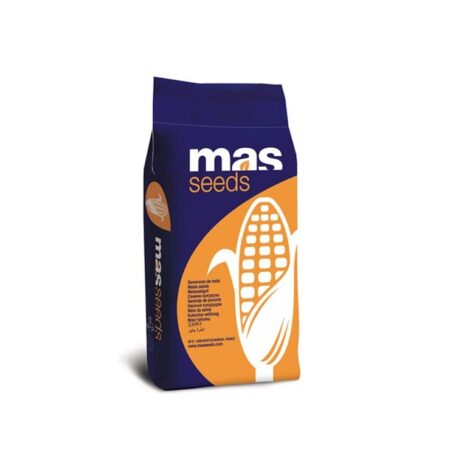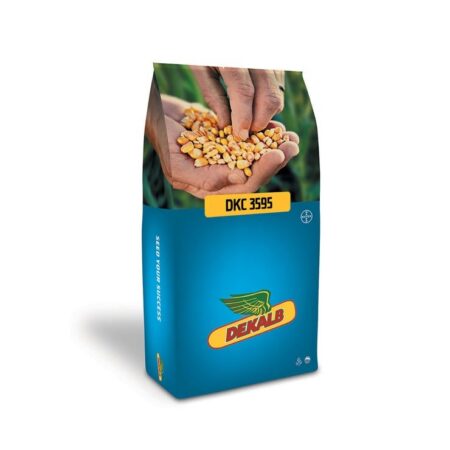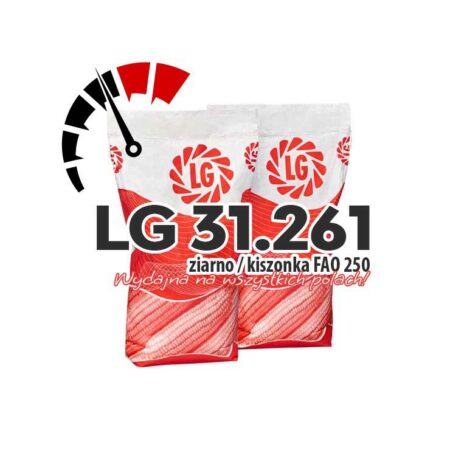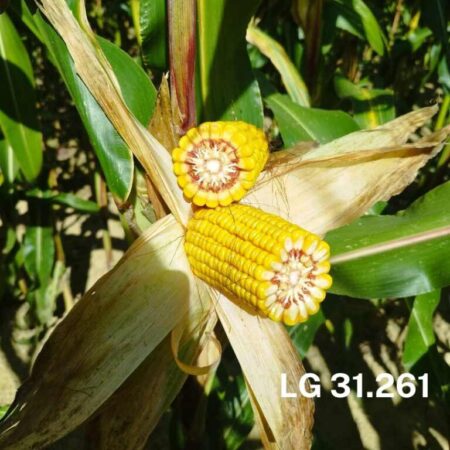Showing 1–12 of 26 resultsSorted by popularity
-
Corn ARBORI CS FAO 240 – 250
The original price was: PLN 545,00.539,99 złCurrent price is: PLN 539,99. Add to cart -
Corn MAS 20.F FAO 230
The original price was: PLN 490,00.485,99 złCurrent price is: PLN 485,99. Add to cart -
Corn LG 31.261
The original price was: PLN 520,00.516,95 złCurrent price is: PLN 516,95. Add to cart
Corn seeds – a large selection of corn seeds
Corn is one of the three most frequently cultivated plants in the world, along with rice and wheat. It is relatively easy to grow and is widely used.
It is used as animal feed, for the production of groats, flour, starch, alcohol and even for the production of bioethanol.
What should you pay attention to when choosing a corn variety?
When choosing a corn variety, it is worth paying attention to several important factors. First of all, these are the parameters of the seeds, and the quality of the soil in which the seeds will be sown is also important.
Although it must be admitted that corn copes well even on poor soils. Another important issue when choosing corn seeds for sowing is their resistance to stress and their fertility.
When it comes to the territory of Poland, it is recommended to choose varieties that are resistant to changing weather conditions.
Due to Poland's geographical location, we are dealing here with a large temperature range during the growing season and with the seasonal phenomenon of drought.
Maize earliness and fertility
The basic parameter that should determine the choice of corn grain is its earliness, determined by the FAO parameter. The earliness of corn is directly related to the length of its growing season.
In Poland, the following FAO division of corn is used: the first FAO group below 190 is the so-called very early variety. Corn varieties with FAO 200-230 are called early, FAO 240-250 corresponds to medium-early varieties.
In the case of FAO 260 – 290, we are dealing with medium-late varieties, while for FAO above 300, we are dealing with late varieties.
The latter is mainly suitable for the warmest regions of the country. It is assumed that the highest yield is obtained with late varieties.
If we want a high percentage of cobs, early varieties will be the best.
Corn varieties – corn for grain and corn for silage
The purpose of corn seeds is very important when deciding on the appropriate variety of this plant. The most important aspect in this case is the so-called efficiency.
Corn seeds intended for silage should have a high starch and energy content and a dry matter content of 30-35%. . Medium-early varieties are particularly recommended for silage cultivation.
Corn seeds for grain
In the case of corn intended for grain, the most important aspect is the possibility of harvesting a crop with low moisture.
Thanks to this, such corn for grain does not need to be dried, which reduces the costs of cultivation. Corn varieties that are resistant to diseases and pathogens are recommended for cultivation for grain.
We cordially invite you to familiarize yourself with the offer of corn grains available in our store. If you have any questions or doubts, we will be happy to provide any assistance.
Corn seeds for sowing
Growing corn for grain is an important segment in the crop structure, constituting one of the three most frequently cultivated crops in the world, along with rice and wheat.
Corn for grain is a product optimally suited to the soil and climatic conditions in Poland.
Thanks to its nutritional values, corn grain is a high-quality and high-energy feed for animals, both dairy cows and fattening animals.
Corn intended for grain has a wide range of applications, it can be used to produce biofuels, bioethanol or industrial starch.
Suitable type of grain, corn varieties
When selecting appropriate corn seeds, it is worth paying attention to tolerance to various environmental conditions and the appropriate type of grain.
Even though corn is a relatively resistant plant to various weather conditions, its parameters may vary depending on the variety.
To maximize the effectiveness of our crops, we need to choose the right variety and ensure its suitability for use.
If we take into account the soils found in our country, it is worth investing in corn varieties that are highly resistant to various weather factors.
In the case of corn, the temperature variability typical of the local climate and the seasonal phenomenon of summer drought may affect the quality of the subsequent harvest.
Our offer includes high-quality corn varieties that are suitable for grits. A suitable variety with a thin rachis and high yield potential will be used in many agricultural farms.
When choosing appropriate varieties, we should pay attention to the appropriate FAO coefficient, which tells us how long their growing season is.
An FAO coefficient of more than 300 is considered a late variety, best suited to warm climates, while an FAO value of less than 210 is a very early variety.
It is generally accepted that the best yields are produced by plants from medium-late and late varieties.
Depending on whether we want to focus on a high or low cob percentage, the corn variety should have a long or short vegetation period.
Some varieties have a very good DRY-DOWN effect, characterized by low humidity and a correspondingly high yield potential.
Low-slung cobs, strong stems and a strong root system are the characteristics of varieties intended for bioethanol production.
Corn for silage
The corn variety intended for silage should have a high starch content, excellent digestibility and dry matter content. , which should be from 30 to 35%.
The purpose of the corn variety is one of the most important things when deciding to purchase specific seeds. A good choice in this area will allow you to produce high-quality feed.
Sowing corn for grain
If we grow corn for grain, the most important issue will be a sufficiently low crop moisture content.
The need for additional drying of the grains entails additional costs that we do not want to expose ourselves to.
Corn seeds for grain should be highly resistant to diseases and pathogens.
If you have any questions, please contact our customer service department.
Corn, along with wheat and rice, is one of the main crops in the world. It is used in many areas. Also in the food industry, including the baking, oil and brewing industries for the production of flour, groats and oil.
Corn is used in the production of fodder - corn for silage. It is also used in the paper industry as a raw material or for the production of biomass.
How to choose the right corn variety?
When choosing a corn variety, you should consider several factors. One of the main factors to which we pay attention should be the variety parameters. Attention should also be paid to the type of soil in which corn is to be grown and the climatic conditions prevailing in a given area. Corn generally does well in almost any type of soil.
An important factor when choosing the best corn is its fertility and resistance to stress conditions.
In Poland, it is best to pay attention to varieties with high tolerance to changing weather conditions. In our climate, the threat is the high temperature range during the development period and the possibility of drought.
Another important parameter determining the selection of corn is its earliness, determined by the FAO parameter. It refers to the length of the growing season necessary to accumulate dry matter.
In Poland, we are divided into five groups of varieties according to FAO: below 190 - very early varieties, 200-300 early varieties, 240-250 medium-early varieties, 260-290 medium-late varieties and over 300 late varieties.
The highest yield is obtained from medium-late and late varieties.
If you need to obtain a high percentage of cobs in dry matter, it is better to choose early varieties, if the percentage of cobs is to be low, it is better to choose late varieties.
Type of grain and variety of corn
Corn is a plant that is relatively resistant to climatic conditions and does not require much in terms of soil quality, but its parameters in this matter may vary depending on the variety. For this reason, it is worth paying attention to the tolerance of individual varieties to soil and climatic factors.
In order to increase the efficiency of crops, it is worth selecting varieties in terms of their resistance to changing temperatures, humidity and possible droughts.
When choosing corn seeds, remember what the crop will be used for. You should pay attention to the FAO coefficient, remembering, for example, that varieties with FAO above 300 (late varieties) perform best in warm regions, and in Poland, varieties below this FAO perform best.
We invite you to familiarize yourself with the wide range of corn seeds for sowing available in our store, and if you have any questions or doubts, please contact us.
read on


















